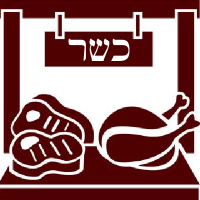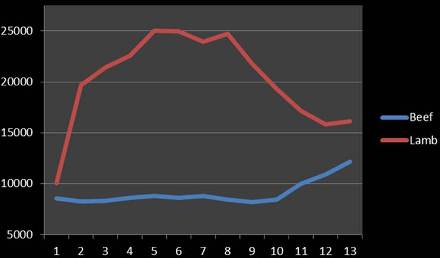Banner
Do we really have a kosher meat crisis?
UOS Executive Director Darren Sevitz says: “There is no shortage of meat. There is an abundance of sensationalist journalism designed to create panic for no good reason.” Ian Lurie of Nussbaums, arguably the largest kosher butchery in SA, says: “We are experiencing a shortage in supply of beef and lamb.” Dr Shaun Morris, a specialist feedlot expert, veterinarian and long-standing shareholder of one of the larger kosher butcheries in Johannesburg, told JR Wednesday: “I concur with Ian Lurie that there is a shortage.”

ANT KATZ
Kosher butchers in Johannesburg and well-placed industry sources say there is a kosher meat crisis – both in the short term ahead of the High Holidays and in the long term regarding sustainable supply. But the UOS insists there is no crisis…
Asked on the Kashrut SA Facebook page on Tuesday if there is a shortage of kosher (red) meat, UOS Executive Director Darren Sevitz responded: “There is no shortage of meat. There is an abundance of sensationalist journalism designed to create panic for no good reason. One of the abattoirs is no longer doing kosher slaughter, and we are looking for a replacement.”
But also on Tuesday, however, Ian Lurie (proprietor of Nussbaums, which is arguably the largest kosher butchery in South Africa), sent thousands of customers the following e-mail: “At the moment we are experiencing a shortage in supply of beef and lamb; we do recommend you take your meat for the Yomtovim early and freeze, to save you and us the last minute pressures.”

RIGHT: The graph represents the number of cattle and lambs slaughtered for the kosher market between 2001 and 2013. The demand for beef rose significantly – by almost 50% – between 2010 and 2013. 2014’s figures for beef are expected to be in line with last years’.
Dr Shaun Morris, a specialist feedlot expert, a veterinarian and long-standing shareholder of one of the larger kosher butcheries in Johannesburg, told Jewish Report on Wednesday: “I concur with Ian Lurie that there is a shortage.”
Morris, who is integrally part of the industry, from feedlot to retail, says that the majority of large feedlots in the country are vertically integrated, meaning they own their own abattoirs.
Morris says the problem arose when a new imam was appointed at the National Independent Halaal Trust who went to major kosher abattoir Morgan Beef and took a different view to his predecessor.
He wanted two changes: That the processing line being held up for an hour to sterilise it between kosher and halaal slaughtering; and that separate refrigeration storage facilities would be required for kosher and halaal and that there needed to be an hour’s interval between when kosher slaughter is done, and halaal slaughter begins.
Morris says that while in most years at the end of winter kosher shochtim reject around 50 percent of the cattle offered for slaughter due to lung disease from pneumonia, the rejection rate this year is around 60 percent.
‘No long-term plan’ – Morris
He is concerned about this as the kosher community “doesn’t have a long-term plan to consistently supply kosher beef to the South African community”, he told Jewish Report. “I was in Polokwane trying to arrange supplies yesterday.”
While he does not believe the new imam was acting with any political agenda, he says: “I would suggest that our rabbinate sit down with the halaal representatives and try and sort it out.”
The biggest concern he has is that butchers are going to have to stock up ahead of Sukkoth and Simchat Torah, because those festivals fall on problematic days for slaughtering.
This past winter’s high incidence of pneumonia in cattle generally, says Dr Morris, means that more that more than 40 percent of cattle delivered for kosher slaughtering at a makeshift abattoir in Sasolburg have been rejected.
Morris says that the industry is “incredibly grateful to the abattoirs that have assisted us,” after a major supplier, the Morgan Group, stopped kosher schechting at their facility last month.
READ LAST WEEK’S STORY: KOSHER MEAT CRISIS LOOMS
Yaakov Lazarus of Moishe’s and Trevor’s Kosher Butchery – one of the main suppliers of Mehadrin Commission meat – told the Jewish Report last week: “At the end of June we got an e-mail from the Morgan Group – the biggest throughput abattoir from which we get almost 100 per cent of our meat, except for another smaller supplier for lamb – that they can’t do kosher slaughter anymore.”
Lazarus said that he had been told that “this was a result of a new requirement from the National Independent Halaal Trust”.
Lazarus says Morgan came to a business decision that continuing with kosher slaughter was not good business because the Jewish market is much smaller than the Muslim market and Morgan chose the Muslim market as the better business decision.
Morris says he has now contacted some of his connections who are prepared to assist in supplying additional cattle for slaughter. But, he says, it is impossible to get volume.
Morris says he does not believe that the Beth Din is doing enough about alleviating the problem. “I have not seen any proactive approach from the Beth Din to try and assist the industry – first of all in the short term to obtain additional cattle ahead of the High Holidays, and secondly to cement a long-term relationship with an abattoir,” he said on Wednesday.
The easiest solution, says Morris, would be for the Beth Din and the industry to sit around a table and understand what the problem is.